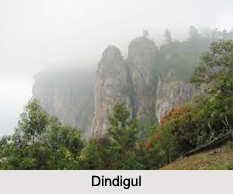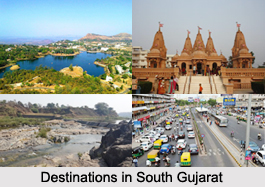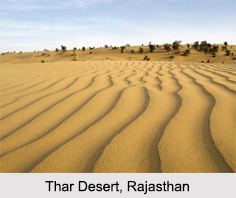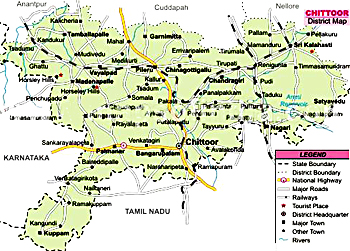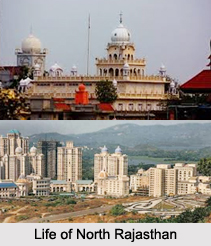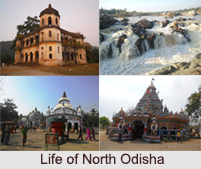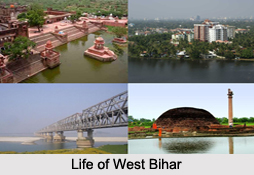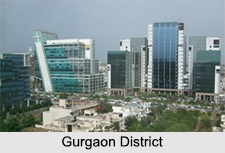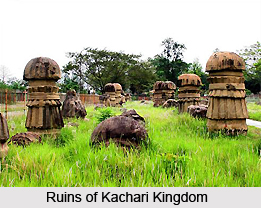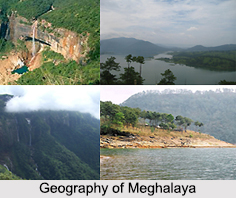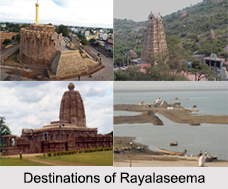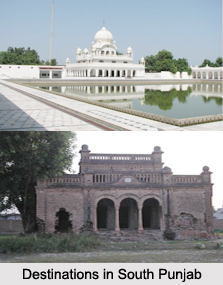Introduction
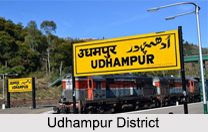 Udhampur is a district in the Indian state of Jammu and Kashmir. The place is named after Raja Udham Singh, the eldest son of Maharaja Gulab Singh, the founder of Dogra rule in Jammu and Kashmir. The town Udhampur is the headquarters of the district. It covers an area of 4,550 square kilometres in the Himalayan Mountains. It is the home to Vaishno Devi.
Udhampur is a district in the Indian state of Jammu and Kashmir. The place is named after Raja Udham Singh, the eldest son of Maharaja Gulab Singh, the founder of Dogra rule in Jammu and Kashmir. The town Udhampur is the headquarters of the district. It covers an area of 4,550 square kilometres in the Himalayan Mountains. It is the home to Vaishno Devi.
Location of Udhampur District
District Udhampur lies between 32 degree-34 minute to 39 degree-30 minute North Latitude and 74 degree-16 minute to 75 degree-38-minutes East Longitude. The altitude of District Udhampur varies from 600 meters to 3000 meters Above Mean Sea Level (AMSL). The District is located in the South-Eastern part of Jammu and Kashmir State and is surrounded in the West by Rajouri District, in the North by Anantnag District, in the North-East by Doda District, in the South-East by Kathua District and in the South-West by Jammu District.
Geography of Udhampur District
Udhampur district has a diverse topography. It is inter-woven with Shivalik hills. There are very few inhabited areas above the height of 1,112 meters or so which experience snow fall and severe cold in the winter. Due to latitudinal deviation from 600 meters to 3,000 meters above sea level there is wide variation in temperature in different parts of the district. The temperature rises sometimes as high as 42 degree Celsius and rarely goes below 1.5 degree Celsius in low altitude areas. May, June and July are the hottest months when the temperature rises to 42 degree Celsius. December, January and February are the coldest months when the temperature in some areas goes below 1.5 degree Celsius. Rainfall usually takes place during July, August and September in summer and in January and February in winter.
Administration of Udhampur District
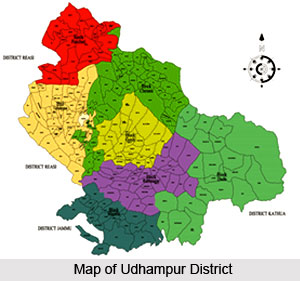 Administration of Udhampur District is the responsibility of the Deputy Commissioner. He is the Executive Head and has three fold roles such as: Deputy Commissioner, District Development Commissioner, and District Magistrate. The Deputy Commissioner is the Chief Revenue Officer and is accountable for collection of Revenue and other Government dues recoverable as arrears of Land Revenue. He deals with the Natural Calamities like hailstorms, floods, draught, and fire etc. The District Magistrate is responsible for the preservation of Law and Order in the District. He is conferred with very extensive powers by the law, which if used cautiously can be very effectual in maintaining peace and harmony. The police force is for the most part an instrument provided by Law for the District Magistrate. He can enforce restriction on the movement of illegal Assembly. In addition to these the Deputy Commissioner is the Chairman of various Central Sponsored projects.
Administration of Udhampur District is the responsibility of the Deputy Commissioner. He is the Executive Head and has three fold roles such as: Deputy Commissioner, District Development Commissioner, and District Magistrate. The Deputy Commissioner is the Chief Revenue Officer and is accountable for collection of Revenue and other Government dues recoverable as arrears of Land Revenue. He deals with the Natural Calamities like hailstorms, floods, draught, and fire etc. The District Magistrate is responsible for the preservation of Law and Order in the District. He is conferred with very extensive powers by the law, which if used cautiously can be very effectual in maintaining peace and harmony. The police force is for the most part an instrument provided by Law for the District Magistrate. He can enforce restriction on the movement of illegal Assembly. In addition to these the Deputy Commissioner is the Chairman of various Central Sponsored projects.
Revenue Administration has historically been the most important responsibility of District Administration. This involves gathering and fixing of land revenue, registration, mutation and overall management in regard to land - private and public. Besides the Revenue Branch of the Deputy Commissioners Office, which is looked after by Assistant Commissioner (Revenue), there are five outlying Revenue Circles (Tehsils) in the district, administered by Tehsildars. Tehsildars are in charge for collecting land revenue (Khazna) from land owners (pattadars). All the Tehsildars, and also the Settlement Officer (since Settlement Operation in progress in the district) are required to submit `doul` (demand of revenue) to the District Commissioner, and after his sanction, Tehsildars are to collect revenue as per the demand.
Apart from Revenue matters, District Development is one of very significant objective of the District Administration. As head of the District Administration, DC is liable for all round developmental activities in the district under various programmes. For this work, the DC assigns one Chief Planning Officer (CPO) the particular task of looking after and coordinating various developmental activities undergoing in different sectors. All development departments in the district, like PWD, Health, Irrigation, Education and many others are aided in this matter by the Planning Section of the DC`s office, headed by the Chief Planning Officer. For management and execution of various developmental schemes, elected bodies are constituted at the level of Municipal Council and Committees for Urban Areas and Panchayat Bodies for the rural areas.
Maintenance of Law and Order is another vital facet of district administration and the DC also being the District Magistrate is in charge for proper safeguarding of the same. The DM is supported by the Additional District Magistrate`s, Sub Divisional Magistrate`s and Executive Magistrate`s. The Tehsildar of the Tehsils also function as Executive Magistrates and are responsible for upholding of Law and Order in their respective Tehsils. The DM and other magistrates take the required assistance from the police department for any necessity. District Police Administration is headed by the Senior Superintendent of Police. The police department has an infra-structure of Two Police Districts, Seventeen Police Stations, Thirteen Police Posts and other supplementary establishments in the district.
People of Udhampur District
The majority of the population of the district practice Hinduism. Greater parts of the population are of Dogras in this district. There are a large number of nomadic Gujjar`s and Bakarwal`s present in the district as well. The chief languages spoken in the district are Dogri, Hindi, Urdu, and Kashmiri. Udhampur is the fifth most populous district of the Jammu and Kashmir State which comprises 7.34 percent of total population of the state. Out of total population of 7.38 lakhs, the total male population is about 3.94 lakh i.e. 53.45 percent of total population as compared to 3.44 lakh female. The Sex ratio of the District is 871 females per 1000 males in the District Udhampur as per 2001 census, against the 900 females per 1000 males for the whole State. The Literacy rate for the District Udhampur is 54.16 percent as per the 2001 census against the 54.46 percent of the State.
Culture of Udhampur District
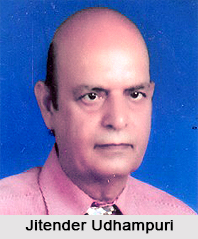 Culture plays an imperative role in the life of the people of Udhampur District. Language, literature, folk art etc are an integral part of their culture. Culture of Udhampur District is rich and diverse. The most important languages spoken in the district are Urdu, Hindi, Kashmiri, and Dogri. Apart from these languages other main dialects spoken in the district are Pehari, Goujri etc. The Dogri language belongs to the Aryan languages and many words of the Dogri language are derivative from the Hindi and Sanskrit language. Dogri, the mother tongue of Dogras, has rich tradition of folk literature. The rich literature of Dogri consists of folk tales, riddles and proverbs. There are also a number of narrative poems in the honour of God known as Bhetas. District Udhampur has produced number of Dogri Poets and writer of Dogri Literature such as Sant Ram Shastri, Prakash Premi, Jitender Udhampuri, Jia Lal Jia, Uttam Chand, Dinu Bhai Pant etc.
Culture plays an imperative role in the life of the people of Udhampur District. Language, literature, folk art etc are an integral part of their culture. Culture of Udhampur District is rich and diverse. The most important languages spoken in the district are Urdu, Hindi, Kashmiri, and Dogri. Apart from these languages other main dialects spoken in the district are Pehari, Goujri etc. The Dogri language belongs to the Aryan languages and many words of the Dogri language are derivative from the Hindi and Sanskrit language. Dogri, the mother tongue of Dogras, has rich tradition of folk literature. The rich literature of Dogri consists of folk tales, riddles and proverbs. There are also a number of narrative poems in the honour of God known as Bhetas. District Udhampur has produced number of Dogri Poets and writer of Dogri Literature such as Sant Ram Shastri, Prakash Premi, Jitender Udhampuri, Jia Lal Jia, Uttam Chand, Dinu Bhai Pant etc.
Folk songs and dances are inseparable from the cultural heritage of Udhampur District. Folk songs are sung in different occasions such as marriages and festival. The Bhakh is a chorus narrative song by a group of singers without the complement of any musical instruments. The Bhakh replicates the true Dogra Culture. Bhar is like the Bhakh in which the stories of brave deeds are told. It is usually a love story which ends in tragedy. Gwatri is a singing and dance combined tradition in which the singers recite some text which is enacted by the Gwatari dancers. Karak is a tale ballet singing form sung by a community called `Jogies`. They narrate a popular folk tale in their dance style, performed by three members with accompaniment of typical folk instrument called `Rabab`.
The Dugger culture is scattered in the hilly area. The folk dances of the district Udhampur are Fumenie, Kudd, Surma etc. The Kudd and Fumenie are performed by the peoples living in the Mountainous area of the District Udhampur. These dances are presented both by men and women on the special events like marriages, local fairs and festivals. Kud is mainly a ritual dance performed in honour of Lok Devatas. This dance style is performed generally during nights. Instruments used during this dance are chhaina, flute, narshingha, drums etc. It is the tempo of music which controls the movement of participants. Fumenie dance style is performed by the ladies on the eve of bride`s departure to in-laws house. This traditional dance form gives a picture of the feelings and emotions of women folk. Heren is a traditional theatre form performed during Lohri festival. This style is by and large performed in hilly regions of Jammu.
Education of Udhampur District
The Literacy rate for the District Udhampur is 54.16 percent as per the 2001 census against the 54.46 percent of the State. The rank of district is seventh in the state in terms of Literacy. Literacy rate among female is 39.89 percent against the state average of 41.82 percent. Education is free from 1st class to University level in the District. There are about 991 Primary, 197 Middle, 98 higher secondary schools and two colleges in the District.
Tourism in Udhampur District
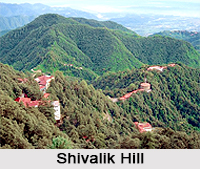 Tourism in Udhampur District is a tourist`s delight. This district of Jammu and Kashmir has a lot to offer when it comes to tourism. Pilgrim tourists, leisure tourists, adventure tourists and nature loves throng this place from all across the world.
Tourism in Udhampur District is a tourist`s delight. This district of Jammu and Kashmir has a lot to offer when it comes to tourism. Pilgrim tourists, leisure tourists, adventure tourists and nature loves throng this place from all across the world.
Pilgrimage Tourism in Udhampur District
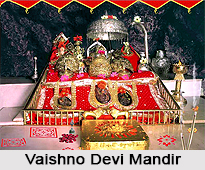 Pilgrimage Tourism in Udhampur District offers quite a lot of religious sites which are thronged by thousands of pilgrims every year. Shri Mata Vaishno Devi Mandir is one of the oldest shrines of India, located at a height of 5300 feet on the sacred Trikuta Hills of the Shivalik Hill Range. The Bhawan, the holy Sanctum of Shri Mata Vaishno Devi Ji is about 13 Kms away from the Base Camp Katra and is connected with a mountainous track. The Goddess Vaishno Devi`s abode is in 100 feet long cave with a constricted opening. The divine cold and crystal clear water washes the lotus feet of the Mata`s "Pindian". There are three natural pindies representing Maha Sarswati, Maha Lakshmi, Maha Kali which represent creative, preservative, and destructive aspects of the Super Power. It is a very old shrine whose reference is found in the Veda and ancient scriptures.
Pilgrimage Tourism in Udhampur District offers quite a lot of religious sites which are thronged by thousands of pilgrims every year. Shri Mata Vaishno Devi Mandir is one of the oldest shrines of India, located at a height of 5300 feet on the sacred Trikuta Hills of the Shivalik Hill Range. The Bhawan, the holy Sanctum of Shri Mata Vaishno Devi Ji is about 13 Kms away from the Base Camp Katra and is connected with a mountainous track. The Goddess Vaishno Devi`s abode is in 100 feet long cave with a constricted opening. The divine cold and crystal clear water washes the lotus feet of the Mata`s "Pindian". There are three natural pindies representing Maha Sarswati, Maha Lakshmi, Maha Kali which represent creative, preservative, and destructive aspects of the Super Power. It is a very old shrine whose reference is found in the Veda and ancient scriptures.
Historic temple Sudh mahadev is situated in the Chenani Tehsil of Udhampur District is 2800 years old. The temple is one the oldest Shiva Temples of Jammu & Kashmir State. Thousands of pilgrims visits the temple particularly during the three day fair held on the occasion of Jeshta Purnima (i.e. Full Moon of June). The striking location of Sudhmahadev temple and Mantalai Ashram adds to the exquisiteness of the place. The Shiv Khori Shrine, one the natural wonders of the region, is considered second only to the Holy Shrine of Mata Vaishno Devi. This supernatural cave is situated in a hillock in Runsoo, a small village in Reasi Tehsil at a distance of about 112 Kms from Udhampur. The cave of the Shiv Khori is about half Kilometer long with very narrow, low entrance, but about 250 feet of the narrow, zigzag passage leads to the very large, high hall inside the cave with the capacity of five hundred people at a time.
Pingla Mata is located at a small hillock in village Pinger in Ramnagar Tehsil, about 20 Kms from Udhampur. The sacred Shrine is about 6 Kms away from the village Kaua on the Domail- Ramnagar Road and is connected with the track. The Shrine consists of small cave where the celestial power lies in the shape of Pindies. The cave of Pingla Mata seems a small hole from outside but it has as much room inside as to provide accommodation to at least five hundred people at a time. The total track consists of lush green pine trees which motivate the devotees to move on. Shiv Parvati Cave Shrine is a natural shrine of the district. The most important attractions of the Holy Shrine are nine and half feet high naturally formed rock Shiva Lingam being protected by Shesh Nag, Joint Parvati Lingam on the left along with the Damroo beat at right, Nandi, Shankhas, Amrit Kund and innumerable images of other deities of Hindu religion.
Leisure Tourism in Udhampur District
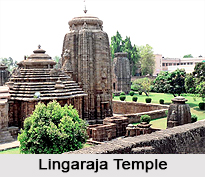 Leisure Tourism is an imperative part of tourism in Udhampur District of Jammu and Kashmir. Babore is one of the most inspiring sites of archaeological significance in the Udhampur District. Now a protected monument, there exited quite a few temples of ancient time. Remnants of six temples in an area of one kilometre have been found. The temples are the stone structures which has resemblance to one, which the Great Kashmir ruler Lalitaditya built at Wangal at the foot of Harmukh Mountain in Kashmir in the 8th century A.D. The vestiges of Babore temples throw lights to how imposing art and architecture was widespread even in that time. These ruins are the structures of great firmness and substantial beauty. Some of the stones, monolithic beams, pillars used in their construction are over a dozen feet long and their sculptures and carving are marvelous and remarkable. The Archaeological Department, Government of India, is presently looking after these ancient monuments and trying to bring these to their original grandeur.
Leisure Tourism is an imperative part of tourism in Udhampur District of Jammu and Kashmir. Babore is one of the most inspiring sites of archaeological significance in the Udhampur District. Now a protected monument, there exited quite a few temples of ancient time. Remnants of six temples in an area of one kilometre have been found. The temples are the stone structures which has resemblance to one, which the Great Kashmir ruler Lalitaditya built at Wangal at the foot of Harmukh Mountain in Kashmir in the 8th century A.D. The vestiges of Babore temples throw lights to how imposing art and architecture was widespread even in that time. These ruins are the structures of great firmness and substantial beauty. Some of the stones, monolithic beams, pillars used in their construction are over a dozen feet long and their sculptures and carving are marvelous and remarkable. The Archaeological Department, Government of India, is presently looking after these ancient monuments and trying to bring these to their original grandeur.
Another grand ancient stone temple complex has been found in North-West of Udhampur town at the village Krimchi in the midst of green hills. Three old temples stand in a row facing east. One of the temples is entirely of rubble. There seem to have been two parallel rows in the East facing the two temples in the outside which makes the complex of a quadrangular pattern. These temples resembles in shape and pattern of Baij Nath and Lingaraja temple at Bhubaneshwar in the state of Orissa. The main temple is adorned with abstract designs and its porch bears a close resemblance to ancient stone temples of Kashmir valley. Some beam like stone slabs used in construction, rest on massive pillars. Pieces of sculpture have been found in the debris have images of Ganesh, Lord Shiva, Trimurti and Lord Vishnu.
The Bhimgarh fort is another protected monument of Udhampur District. The fort is situated in on a hillock in Reasi Town on the bank of river Anji. The fort has a commanding view of Reasi town. In the year 1988, initiative was taken to beautify the spot and make it a picnic spot for the pilgrims of Vaishno Devi. Since then the fort has obtained a novel look with many people visiting it. Another historic building in the area just near the Sheesh Mahal is the Ramnagar Fort overlooking Mansa Devi Nallah. The fort is square on plan with polygonal bastions rising to three stories on four corners.
Nature Tourism in Udhampur District
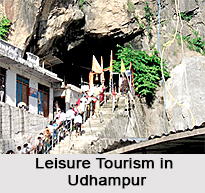
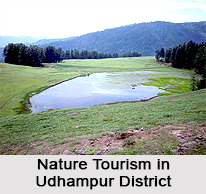 Nature Tourism in Udhampur District is very popular in the state of Jammu and Kashmir. The Mansar Lake, Patnitop, and Sanasar provide great amusement to the tourists. The lake of Mansar is situated 40 kms in the South of Udhampur town on the Udhampur Samba Road. Apart from a picnic spot, Mansar Lake has the religious significance too. People take a holy dip in the water of the lake on festive events. With all pious belief and legacy behind the Mansar Lake is also picking up its recognition among the tourists with all its flora and fauna. The lake has cemented path all around with requisite illumination, with projected view decks to take pleasure in flickering of seasonal birds, tortoise and fishes of diverse species. There is a wild life Sanctuary housing jungle life like Spotted Deer, Neelgai etc. besides other water birds such as Cranes, Ducks etc. One can also observe the traditional and typical distinctive life style of Gujjar and Backarwals wearing cultural costumes, living in open Kullhas around on the hills of Mansar Lake.
Nature Tourism in Udhampur District is very popular in the state of Jammu and Kashmir. The Mansar Lake, Patnitop, and Sanasar provide great amusement to the tourists. The lake of Mansar is situated 40 kms in the South of Udhampur town on the Udhampur Samba Road. Apart from a picnic spot, Mansar Lake has the religious significance too. People take a holy dip in the water of the lake on festive events. With all pious belief and legacy behind the Mansar Lake is also picking up its recognition among the tourists with all its flora and fauna. The lake has cemented path all around with requisite illumination, with projected view decks to take pleasure in flickering of seasonal birds, tortoise and fishes of diverse species. There is a wild life Sanctuary housing jungle life like Spotted Deer, Neelgai etc. besides other water birds such as Cranes, Ducks etc. One can also observe the traditional and typical distinctive life style of Gujjar and Backarwals wearing cultural costumes, living in open Kullhas around on the hills of Mansar Lake.
Patnitop is a prominent hill resort which is suspended on a beautiful plateau, at an altitude of 2024 meters (6400 feet) on Jammu-Srinagar National Highway about 40 Kms from Udhampur District. Encased by deep wooded forests, Patnitop offers striking spots, quiet walks and breathtaking views of mountain scope of the Chenab basin. In winter, the resort is usually enveloped with a thick mantle of snow thus providing opportunities for a variety of snow games including skiing. Sanasar is 60 Kms away from Udhampur and only 19 Kms from Patnitop. Sanasar is a Saucer Shaped meadow bounded by gigantic conifers. A place for quiet holiday, the meadow has now been developed as a nine hole Golf Course. It also provides opportunities for Para-gliding. The tourists enjoy mysteries of nature, widely spread in form of blue skyline in the day, sunlight filtering through charming deodars, hushed silence, calm cool breeze and pine scented flowers strewn meadows.
Kud is a popular tourist resort situated on the Jammu Srinagar National Highway, at an altitude of 1738 meters (5500 feet), in the lap of supercilious mountains and is surrounded by picturesque hills. A most developed hill station of Udhampur District, Kud has been blessed with good peaceful and pleasant weather and has immense natural exquisiteness.
Adventure Tourism in Udhampur District
Patnitop at a height of 7000 feet approximately is shrouded by dense forests rich in flora and fauna is a trekker`s paradise. It is a pleasurable trek of 10-12 Kms from Patnitop. About 8 Kms further steady trek steep in beginning brings one to another enthralling hilly resort Mantalai. Mantalai to Latti is a gradual trek of 13 Kms through pine scented forests. Latti to Kirchi is a trek of 18 Kms through Deodar forests having springs and small rivers in the entire track. One can take pleasure in impressive and perfect scenery. The saucer shaped meadow of Sanasar bordering Patnitop is an alpine resort enclosed by gigantic conifers. From Patnitop to Sanasar is a five hour trek though dense forests. The trekkers get delight from the obscurities of nature, unfolded in form of blue skyline in day, sunlight filtering through elegant deodars, hushed silence, calm cool breeze and pine scented flower strewn meadows.
Visiting Information of Udhampur District
District Headquarters Udhampur is well connected by road. Udhampur is about 155 kilometres by road to Srinagar, Jammu (Capital of Jammu and Kashmir). Some of the rail way stations of district are Udhampur, Ram Nagar which connects most of the towns and villages in the District. Jammu and Kashmir State Road Transportation (JKSRTC) runs Busses from Major cities to Towns and Villages in this District.







